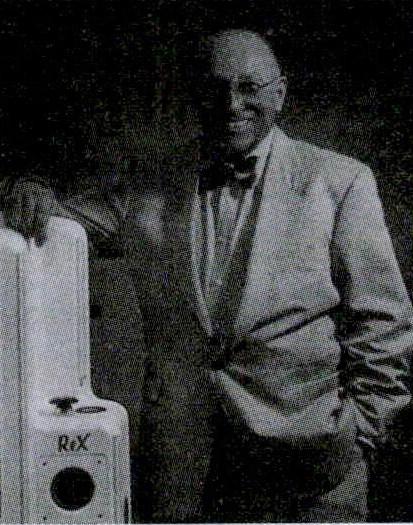Joseph F. Engelberger
2020-09-10刘仪慧
刘仪慧

In 1956, Engelberger met American engineer and inventor George C. Devol at a cocktail party where the two discussed the writer Isaac Asimov s robot philosophies and Devol s patent-pending (正在申请专利的) Programmed Article Transfer device. Engelberger identified the device as a robot, the first ever, and conceived of how it could be used in manufacturing, in particular to perform jobs dangerous to humans.
Forging an historic partnership, Engelberger began work with Devol to get his robotic device developed. In 1957 Engelberger convinced Norman Schafler, CEO of Condec Corp., the parent company of Consolidated Controls, a firm founded and directed by Engelberger, to finance the development of Devol s invention.
By 1959 the first robot prototype was developed—the Unimate #001—and Engelberger immediately set out to convince top American manufacturers in the automotive industry of its benefits. General Motors was the first to take interest, installing the Unimate #001 on its production line at its Trenton, New Jersey. This monumental event revolutionized manufacturing and marked the birth of the robotics industry.
In 1961, once his partner George Devol was awarded US Patent No. 2,988,237 for his robotic invention, Engelberger established Unimation Inc., a Condec Corp. subsidiary (子公司). Located in Danbury, Connecticut, it was the first company of its kind. By 1966 Engelberger expanded Unimation s distribution internationally. By granting licenses to Nokia of Finland and Kawasaki Heavy Industries (now Kawasaki Robotics) of Japan to manufacture and market the Unimate, Engelberger ushered in the European and Asian robotic markets respectively.
A recognized global leader, Engelberger has presented to audiences around the world, including a 1966 appearance on the Tonight Show with Johnny Carson, where he lead the Unimate #001 in a few parlor tricks! That same year, he introduced the Japanese to robotics in an historic presentation in Japan that lead to the development of the Asian robotics market.
Committed to identifying and developing ways in which robots can be used for the good of humankind, Engelberger expanded his research into a niche sector that he introduced—service robots. In 1984 he established Transitions Research Corp., which later became HelpMate, to develop ways in which robots could be used in medical care settings, particularly in service of the geriatric (老年病) population.
Engelberger is also a published author. Among his many published works are his “Economic and Sociological Impact of Industrial Robots,” Proceedings of the First International Symposium on Industrial Robotics, which was published in 1970 to mark this important event; his industry-changing book “Robots in Practice: Management and Applications of Industrial Robots” (Springer, 1983), with a forward by Isaac Asimov; and his book “Robots in Service” (MIT Press, 1989).
Over the years, Engelberger has received numerous awards and recognitions, including several honorary doctorates. In 1984, Engelberger received the esteemed honor of becoming a member of the National Academy of Engineering. In 1986, he became a member of the Connecticut Academy of Science and Engineering.
Engelberger received a Master of Science degree in mechanical engineering from Columbia University while designing control systems for nuclear power plants for the manufacturing conglomerate (企業集团) Manning, Maxwell & Moore. Prior to that, he received a Bachelor of Science in physics after serving in the US Navy. Born in Brooklyn, New York on July 26th, 1925, Engelberger was just seventeen years old when he entered the Navy. Serving in the Marshall Islands from 1942 to 1946, he worked on the atom bomb project “Operation Crossroads” at Bikini Atoll. It was his experience in the Navy that taught him how to be a physicist.
